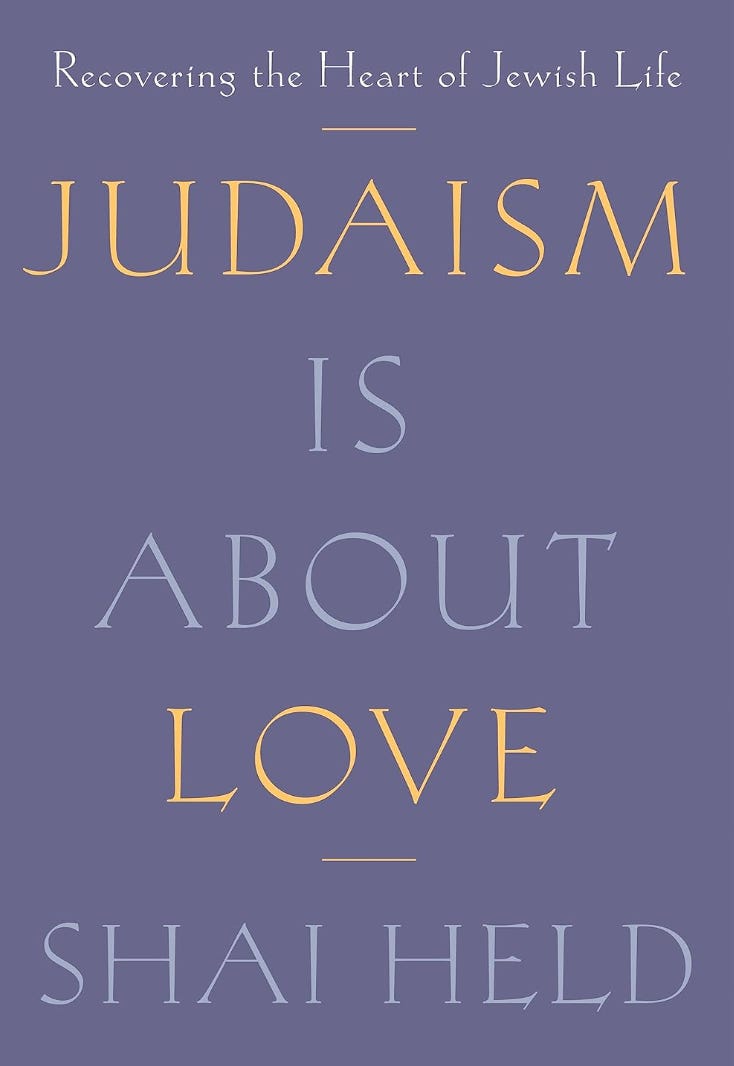
Time after time we Christians discover that what we thought was unique, or at least special, or at least a singular emphasis, is to be found in our Old Testament already. Perhaps an unstated mission in Shai Held new book, Judaism is About Love: Recovering the Heart of Jewish Life, is to show how deep-rooted Jesus and the Christian faith are. Not entirely of course. There’s Jesus, after all.
But a very informative chapter is his eighth chapter, entitled “Loving the Stranger: The Bible’s Moral Revolution.” He will nuance back and forth (at little too much) on how singular loving one’s enemies is with Jesus, but it all begins with the Tanakh’s loving the stranger in the Pentateuch.
He knows this theme cuts into the fabric of both Judaism and Christianity, but his concern is Judaism (at least in this chapter). He opens with this, and for me it forms an important foundation:
“Ask many Jews whom the Torah commands us to love and you will likely get 2 answers: love of God and our neighbor.” Full stop. But get ready to move on: “but the Torah in fact commands three loves: love of God (Deuteronomy 6:5), love of neighbor (Leviticus 19:18), and love of the stranger (ger).” Now to this: “strikingly, of the three loves only love of the ger is repeated twice (Leviticus 19:34 and Deuteronomy 10:19), seemingly for emphasis.” Of course, this leads to a discussion of the meaning of ger.
Does it mean the stranger who is living in the land who is vulnerable and without family to look after her or him? Surely then the love of the ger leads to loving non-Israelites/non-Judeans/non-Jews, those who live among them. He calls this a “major moral revolution” in this: “we are commanded not to just love our vulnerable but to love the vulnerable, whether they are ‘our own’ or not.” At this point the second half of what I call the Jesus Creed has been formed on the basis of the Pentateuch. Love God, love neighbor. There is nothing distinctly Christian about it, unless one simply pins it on Jesus. It may be distinct, but it is not unique. On this the foundation of a Judeo-Christian ethic can be formed. And ought to be.
Held contends not oppressing the ger is not the same as loving. Loving is an emotional and behavioral relationship with someone. As Israel knew what it was like to be stranger, so it was to form empathy, compassion, and love for the stranger. He sees development in the texts:
“Exodus teaches us the baseline requirement: not to oppress the stranger. Leviticus magnifies the demand: not only must we not oppress the stranger, we must actively love him. And Deuteronomy raises the stakes even higher: loving the stranger is a crucial form of ‘walking in God's ways’.” This will mean provisions – by God through the people of God. “How do we show that we have truly opened our hearts to God? By loving those whom God loves – by loving the vulnerable stranger who lives among us.” Israel’s way of walking in God’s ways to form laws that protected the ger: gleaning, tithing, circumcising, participating in Passover and Yom Kippur, and observing the Sabbath. That is, there we expectations for the ger to be observant of a limited number of the laws of Moses. In other words, to assimilate (his term).
You may not know that for 2000 years the term ger has meant “convert, proselyte.” Those who approached, those who joined the people of Israel, those who converted to Judaism were gerim/proselytes.
But Held believes the older sense of the term deserves being remembered and worked out today. The Torah provides an alternative imagination for a new society, and in this love shapes all of life. For instance, in Deuteronomy a (foreign) runaway slave was not to be returned to his master. After all, Israel was a runaway nation. “To be a Jew, according to these texts, is to remember what it's like to be vulnerable and susceptible to exploitation – and to strive to grow in compassion and response.” Thus, the people of God were never to be oppressors themselves. Passover memorializes this very act of liberation. It all pertains to immigrants today. A very very Pentateuchal and Judaism reminder.

















Twenty years later, I still consider "The Jesus Creed" to be the most important book written by a NT scholar that encompasses a biblical theology of life. I can still remember the thrill I had (as a primarily 2/3 Bible person—you know, Hebrew Bible/Old Testament—when I read the advance copy you sent to me, Scot. So, so good!!
Thank you Scott, I am really enjoying reading this book .